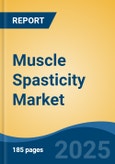Speak directly to the analyst to clarify any post sales queries you may have.
10% Free customizationThis report comes with 10% free customization, enabling you to add data that meets your specific business needs.
Key Market Drivers
Rising Incidence of Neurological Disorders
The rising incidence of neurological disorders is a pivotal driver behind the burgeoning growth of the global muscle spasticity market. Neurological conditions such as multiple sclerosis (MS), cerebral palsy, spinal cord injuries, stroke, and Parkinson's disease frequently manifest with muscle spasticity, characterized by involuntary muscle contractions and stiffness that significantly impair patients' quality of life.Multiple sclerosis, in particular, has seen a notable increase in prevalence. According to the World Health Organization (WHO), over 1.8 million people worldwide are affected by MS, with a higher incidence among young adults and females. This autoimmune disease affects the central nervous system and is a leading contributor to muscle spasticity. As the number of MS cases continues to rise, so does the demand for effective treatments to alleviate the debilitating symptoms associated with the condition. Pharmaceutical companies have responded by developing a range of medications aimed at providing relief and improving the daily lives of patients.
Key Market Challenges
High Treatment Costs
High treatment costs pose a significant hurdle in the global muscle spasticity market, impeding the accessibility of care for individuals grappling with this debilitating condition. Muscle spasticity, characterized by involuntary muscle contractions and stiffness, often results from neurological disorders like multiple sclerosis, cerebral palsy, and spinal cord injuries.While treatment options have advanced, the soaring expenses associated with these therapies present a considerable challenge for both patients and healthcare systems. One of the primary issues driving the high treatment costs is the development and production of specialized medications and medical devices tailored for muscle spasticity management. Pharmaceutical companies invest heavily in research and development to create effective drugs that target the condition's symptoms and underlying causes. These innovative treatments, while offering hope for improved patient outcomes, often come with a substantial price tag, making them financially burdensome for many patients.
Key Market Trends
Increasing Awareness and Education
Increasing awareness and education have become instrumental in propelling the global muscle spasticity market forward. In recent years, concerted efforts by advocacy groups, healthcare organizations, and pharmaceutical companies have led to a significant uptick in public understanding and recognition of this debilitating condition. Muscle spasticity, a common symptom in neurological disorders like multiple sclerosis, spinal cord injuries, and stroke, was often overlooked or misunderstood in the past. However, with increased awareness campaigns and educational initiatives, both patients and healthcare providers are now more informed about its prevalence, symptoms, and available treatment options.Key Market Players
- Ipsen Pharma
- Allergan
- Acorda Therapeutics, Inc.
- Merz Pharma
- Novartis AG
- Beximco Pharmaceuticals Ltd.
- Zydus Cadila
- Porex Corporation
- Teva Pharmaceutical Industries Ltd
- Sun Pharmaceutical Industries Ltd
Report Scope:
In this report, the Global Muscle Spasticity Market has been segmented into the following categories, in addition to the industry trends which have also been detailed below:Muscle Spasticity Market, By Drug Type:
- Baclofen
- Botulinum Toxin
- Diazepam
- Dantrolene Sodium
- Others
Muscle Spasticity Market, By Route of Administration:
- Oral
- Intramuscular
- Others
Muscle Spasticity Market, By Distribution Channel:
- Hospital Pharmacies
- Retail Pharmacies
- Online Pharmacies
Muscle Spasticity Market, By Region:
- North America
- United States
- Canada
- Mexico
- Europe
- France
- United Kingdom
- Italy
- Germany
- Spain
- Asia-Pacific
- China
- India
- Japan
- Australia
- South Korea
- South America
- Brazil
- Argentina
- Colombia
- Middle East & Africa
- South Africa
- Saudi Arabia
- UAE
Competitive Landscape
Company Profiles: Detailed analysis of the major companies present in the Global Muscle Spasticity Market.Available Customizations:
With the given market data, the publisher offers customizations according to a company's specific needs. The following customization options are available for the report.Company Information
- Detailed analysis and profiling of additional market players (up to five).
This product will be delivered within 1-3 business days.
Table of Contents
Companies Mentioned
- Ipsen Pharma
- Allergan
- Acorda Therapeutics, Inc.
- Merz Pharma
- Novartis AG
- Beximco Pharmaceuticals Ltd.
- Zydus Cadila
- Porex Corporation
- Teva Pharmaceutical Industries Ltd
- Sun Pharmaceutical Industries Ltd
Table Information
| Report Attribute | Details |
|---|---|
| No. of Pages | 185 |
| Published | April 2025 |
| Forecast Period | 2024 - 2030 |
| Estimated Market Value ( USD | $ 4.11 Billion |
| Forecasted Market Value ( USD | $ 5.53 Billion |
| Compound Annual Growth Rate | 5.0% |
| Regions Covered | Global |
| No. of Companies Mentioned | 10 |









